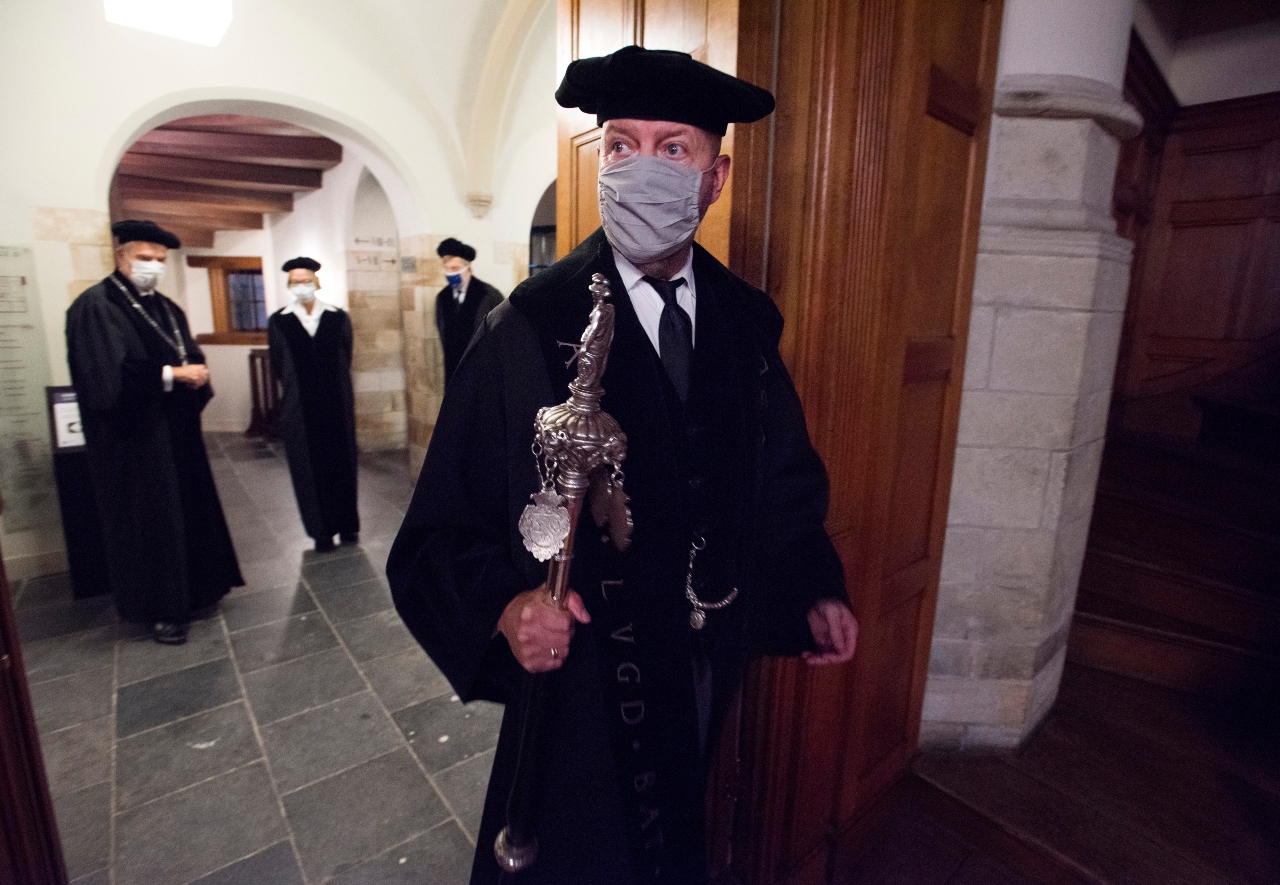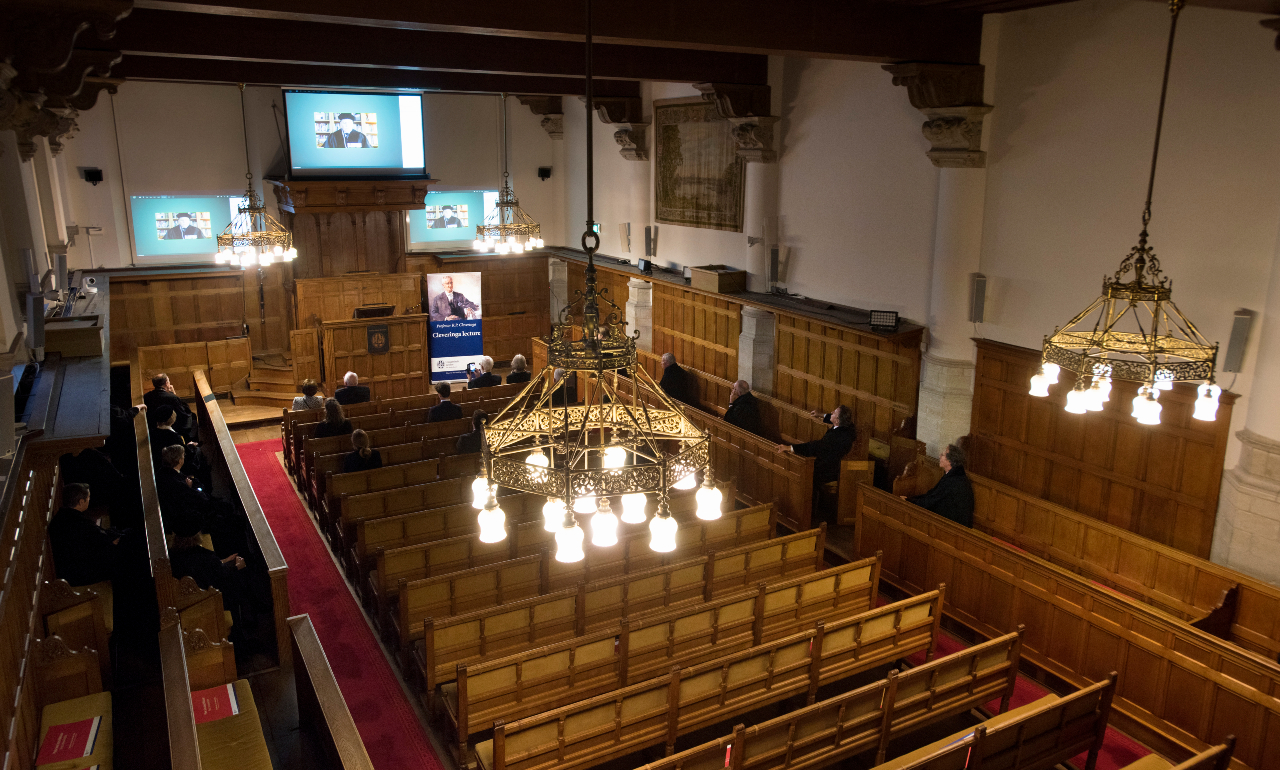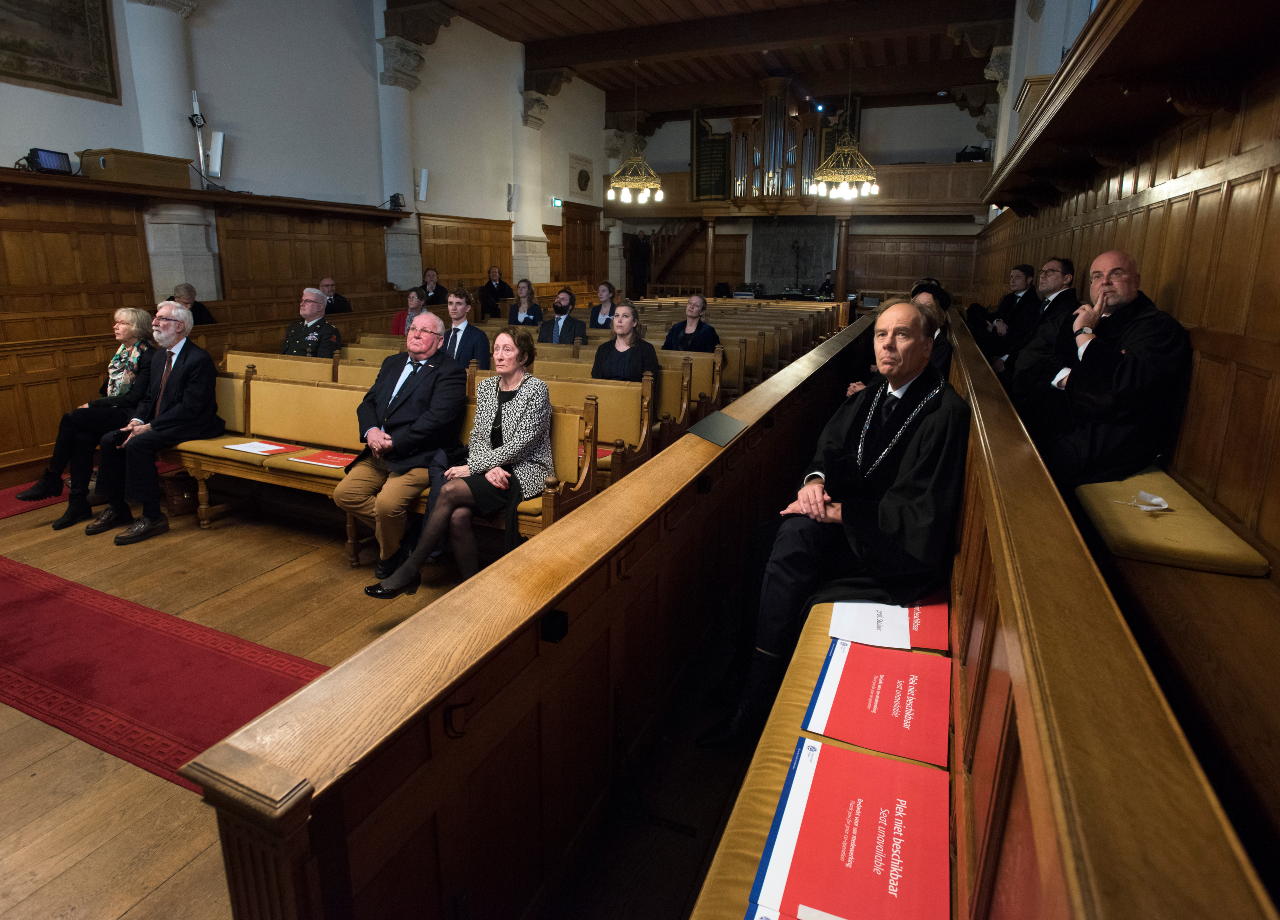
‘Cleveringa’s legacy reminds us of the need to stay vigilant’
The world let Rwanda down at the time of the genocide, and that can never be allowed to happen again, Cleveringa Professor Roméo Dallaire declared in his lecture on 26 November. Dallaire, a retired Canadian Lieutenant-General, also called for more attention to be paid to soldiers suffering the effects of trauma. 'We have to prepare our military better for complex and ambiguous missions.'
It was in some ways a very unusual Cleveringa lecture. Instead of standing on the top step of the lectern in the Great Auditorium of the Academy Building, Dallaire delivered his lecture in front of a webcam in his home town in Canada. Travelling to Leiden in the current circumstances was a bridge too far. The Academy Building had never been so sparsely filled for a Cleveringa lecture. There was a small-scale procession with representatives from the Executive Board, the Deans and a small number of professors, along with a few of Dallaire's family members (Dallaire was born in the Netherlands). The rest of the audience followed this highly personal lecture at home via a livestream. One tradition that was maintained was that Dallaire appeared in full academic dress, the beadle having sent the traditional gown and cap to Canada.
Young girl with explosive vest
Presenting some shocking images, the former Lieutenant-General talked about the painful dilemmas faced by soldiers on the front line. 'Just imagine: you've been ordered to eliminate a danger. But when you look through the lens of your rifle, you see a 12-year-old girl wearing an explosive vest. You have just a split second to react, and none of the possible outcomes is good. If you do nothing, a bomb will go off in a crowded market, leaving dozens of victims. If you fire, you'll never again be able to look your own children in the eye.'

Abort the mission
The former Lieutenant-General himself was the key player in the next dilemma he put before the audience. 'Just think: you are commander of an international peace operation during a genocide: people are being slaughtered en masse and their mutilated bodies are littering the streets. You have 32,000 people in your camp who need to be protected, but you have no food, no water, no ammunition and the UN headquarters in New York is advising you to abandon the mission.'
Moral responsibility
This was the dilemma faced by Dallaire in 1994 when he was the commander of a UN peace-keeping mission in Rwanda. The Canadian Lieutenant-General called for more support, but the UN decided to withdraw its troops - right at the point when the Hutus had started to massacre the Tutsis and moderate Hutus. ‘I was told that there was no oil in Rwanda and no other strategic resources.' To make matters worse, Secretary-General Boutros-Ghali decided that the situation was too dangerous for a peace corps of 450 soldiers. Dallaire refused to withdraw. 'Like Professor Cleveringa, I felt I had a greater moral and ethical responsibility.'
Are some humans more human than others?
Together with a contingent of Canadian, Ghanaan and Tunisian soldiers, they stayed in Rwanda longer to protect the citizens in their camp. They managed to fulfil this mission, but in the rest of Rwanda, 800,000 Rwandan people were massacred over the next hundred days, Dallaire said. At the same time, the UN and NATO sent around 10,000 soldiers to the civil war in the former Yugoslavia. Since then, there is one question that has gnawed at Dallaire: are some humans more human than others?
Child of genocide
He brought up a memory he has of an emaciated young boy who suddenly appeared by the side of his truck in Rwanda. The young boy fled to his hut, where they later found him among the dead bodies of his parents and brothers and sisters, all part eaten by rats. 'I looked into his eyes - this child of the genocide - and saw the eyes of my own six-year-old son. This child caught in the middle of a civil war was every bit as much a human being as my own son back home.'
PTSD
After these traumatic experiences in Rwanda, Dallaire had a breakdown and struggled for many years with post-traumatic stress disorder, PTSD. At that time, little attention was paid to caring for disturbed military personnel like himself. Dallaire tried to drown his traumas with alcohol, and made several attempts at suicide, he told his audience with remarkable openness. And it turned out that he was by no means the only soldier who wanted to take his own life: 158 Canadian soldiers were killed in Afghanistan but a further 71 committed suicide after the mission.'We have to remember not only the soldiers killed in action, but also those who took their own lives. It is crucial that we prepare soldiers better for these types of complex and ambiguous missions.'
Remain vigilant
Dallaire compared his own experiences with those of Cleveringa. ‘Just as Cleveringa knew, and I am sure that you know: no person has any more right to life, dignity and respect than the next individual. But we see this basic right being violated on a daily basis: sexual violence, terrorism, the use of child soldiers...' This realisation prompted the former Lieutenant-General to set up the Dallaire Institute for the rights of children. He ended his lecture with an appeal to governments and knowledge institutions such as universities to focus more of their efforts on these issues. He also had a message for young people. 'I am appealing especially to children and young people: you are the borderless generation because you seem to know and understand that all human beings are part of the same wider community.' And finally, Dallaire referred to Cleveringa. 'His legacy reminds us of the need to stay vigilant, now and always. Because every human being is just that: a human being. And no person is more of a human being than any other.'
Text: Linda van Putten
Images: Marc de Haan
Video
Due to the selected cookie settings, we cannot show this video here.
Watch the video on the original website or


